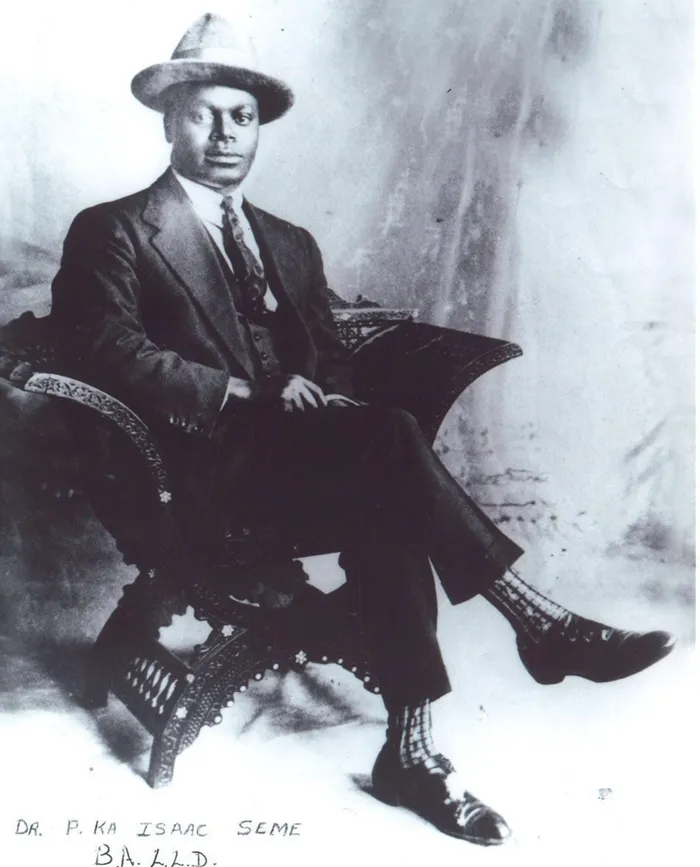
Pixley ka Isaka Seme on completion of his law studies at Oxford University.
Image: File
NEXT month, a significant milestone in global governance will unfold on African soil as South Africa hosts the G20 summit. As the only permanent African member of the forum, South Africa’s presidency represents a crucial opportunity for the continent’s voice to be heard at the highest level of international decision-making.
The recent admission of the African Union (AU) as a permanent G20 member further solidifies Africa’s seat at the table, creating an unprecedented platform for continental representation.
As world leaders gather in Johannesburg next month alongside invited African heads of state, they would do well to remember the words of one of Africa’s greatest visionaries, Pixley Ka Isaka Seme, the founder of the African National Congress (ANC), the first African to graduate from Columbia University in New York, and true father of the African diaspora concept. Nearly a century ago, he proclaimed: “The brighter day is rising upon Africa.
“Already I seem to see her chains dissolved, her desert plains red with harvest, her Abyssinia and her Zululand the seats of science and religion, reflecting the glory of the rising sun from the spires of their churches and universities. Her Congo and her Gambia whitened with commerce, her crowded cities sending forth the hum of business, and all her sons employed in advancing the victories of peace, greater and more abiding than the spoils of war.”
Today, that brighter day is dawning across Africa, in Kenya's solar-powered villages where homes now have reliable electricity, in Senegal’s women-led energy cooperatives that are powering entire communities, and in Algeria’s growing tech hubs developing climate solutions.
While welcoming genuine international partnership and investment, Africa is not passively waiting for foreign rescue. Africans are decisively charting their own sustainable path forward while remaining open to meaningful collaboration and building upon existing local initiatives.
What Seme envisioned as “her crowded cities sending forth the hum of business” now manifests in Lagos’s fintech ecosystem, which is number one in Africa, Accra’s innovation city, and startup scenes in Ivory Coast. The “desert plains red with harvest” appears in the form of solar farms powering agricultural processing plants across the Sahel, Northern Cape in South Africa and Namibia.
Seme also noted that African students abroad would “return to their country like arrows, to drive darkness from the land”. Today’s diaspora continues this tradition through new forms of engagement that transcend physical return.
Senegalese engineers in Texas have pooled resources to fund solar micro-grids serving thousands of households. Kenyan data scientists in London are collaborating on AI solutions, Nigerian finance professionals in Atlanta are structuring green bonds for sustainable infrastructure projects across West Africa.
At the highest levels of global technology, leaders like James Manyika from Zimbabwe, Senior Vice President of Google and Alphabet, also demonstrate how African talent is shaping the future of technology and artificial intelligence on a global scale.
As President for Research, Technology & Society for Google and Google DeepMind, Manyike represents the pinnacle of African intellectual achievement abroad, not as a departure from Seme's vision, but as its ultimate fulfilment, where African minds are now driving global technological progress while maintaining their connection to the continent’s development.
Yet we must be honest about challenges. The diaspora’s potential remains largely untapped. Remittances to sub-Saharan Africa reached $54 billion (R929bn) in 2023, but these funds primarily support individual family needs rather than structured investment in sustainable development.
Our collective power remains fragmented, our impact diluted by a lack of coordination. But the foundation Seme laid a century ago provides the blueprint for what's possible when African genius is properly organised and channelled.
The G20 leaders gathering in South Africa have a choice: they can deliver yet another set of declarations, or they can partner with a movement that’s already transforming Seme’s vision into reality.
They can recognise that Africa’s imminent economic revolution doesn’t need saving; it needs partners who understand that the brighter day Seme saw coming is already here, waiting only for the world to recognise and support it through meaningful collaboration rather than paternalistic aid.
* Ambassador Abdou Samb is a Senegalese engineer, mathematician, European Commission advisor on digital transformation and honorary Ambassador of the Panafrican Parliament for diaspora affairs. He is also the President of Paris FRS Consulting and the Abdou Samb Foundation.
** The views expressed here do not reflect those of the Sunday Independent, IOL, or Independent Media.